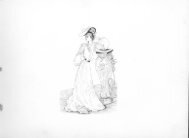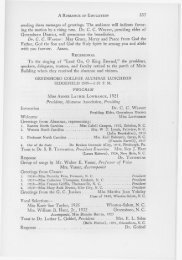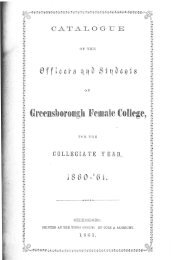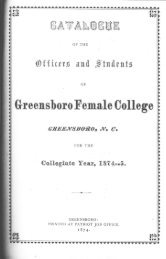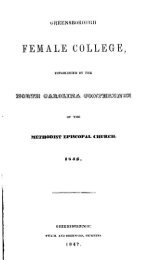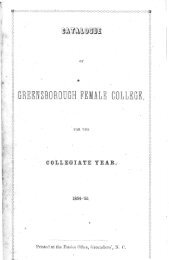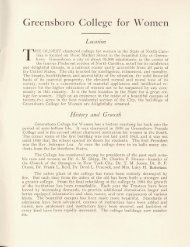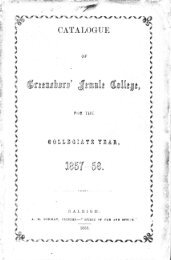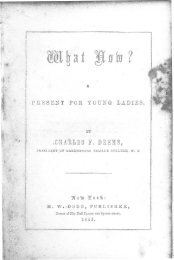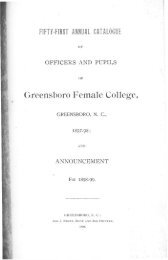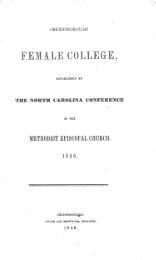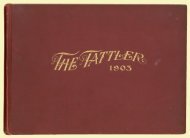REV. BENJAMIN FRANKLIN DIXON, MD - Brock Historical Museum ...
REV. BENJAMIN FRANKLIN DIXON, MD - Brock Historical Museum ...
REV. BENJAMIN FRANKLIN DIXON, MD - Brock Historical Museum ...
Create successful ePaper yourself
Turn your PDF publications into a flip-book with our unique Google optimized e-Paper software.
<strong>REV</strong>. <strong>BENJAMIN</strong> <strong>FRANKLIN</strong> <strong>DIXON</strong>, M.D.<br />
(Fifth President)
MRS. <strong>BENJAMIN</strong> <strong>FRANKLIN</strong> <strong>DIXON</strong><br />
(Mrs. Nora Catherine Tracy Durham Dixon)
A WORD-PICTURE OF MRS. <strong>BENJAMIN</strong> F. <strong>DIXON</strong><br />
(Mrs. Nora Tracy Durham Dixon)<br />
By MRS. JUANITA COLTRANE<br />
GARRISON (Mrs. D. A. Garrison)<br />
Gastonia, N.C.<br />
Nora Tracy Durham Dixon was the daughter of Dr. and Mrs. James Wright<br />
Tracy. She was one of the remarkable women of North Carolina. She was mar-<br />
ried when quite young to Captain Plato Durham and to this union were born<br />
five children, three of whom grew to manhood. These were Robert Lee Durham,<br />
Stonewall Jackson Durham, and Plato Tracy Durham. Captain Durham died in<br />
1875. Later she married Benjamin Franklin Dixon, who had courted her in her<br />
girlhood when they were rivals in school. Three children came to bless this<br />
union. One daughter, Pearl, and twin sons, Ben F., Jr., and Wright Tracy.<br />
Mrs. Dixon was a slender woman of medium height with blue eyes and<br />
brown hair. She had a most remarkable mind and a keen sense of humor. She<br />
wrote a beautiful hand that looked like steel engraving, and found time in her<br />
very busy life to do exquisite fancy work.<br />
As the wife of a physician, minister, orphanage president, college president,<br />
and a government official, she reigned like a queen in her home. She was at home<br />
wherever she went and was always most hospitable. When she was the wife of<br />
the President of G.F.C., she was greatly loved by all the girls, who felt at<br />
home with her, often congregating in her room at night for a good time. She<br />
had a great influence for good, not only over her own family, who looked up<br />
to her in all things, but also over the girls in the College.<br />
Her last days were spent with her daughter, Pearl (Mrs. W. L. Balthis), in<br />
Gastonia. She numbered her friends by her acquaintances. None knew her but<br />
to love her. One of her outstanding traits was her deep spirituality. She had a<br />
sweet voice and loved to raise it in praise of her Heavenly Father.<br />
She died April 19, 1933. Her going was a triumph for her, but a great<br />
loss to her loved ones and friends.<br />
<strong>REV</strong>. <strong>BENJAMIN</strong> <strong>FRANKLIN</strong> <strong>DIXON</strong>, M.D.<br />
Born in Cleveland County, N.C., March 27, 1845.<br />
Married Mrs. Nora Catherine Tracy Durham, July, 1877.<br />
Died in Raleigh, N.C., September 26, 1910.<br />
Buried in Oakwood Cemetery, Raleigh, N.C., September 29, 1910.<br />
MRS. NORA CATHERINE TRACY DURHAM <strong>DIXON</strong><br />
Wife of<br />
<strong>REV</strong>. <strong>BENJAMIN</strong> F. <strong>DIXON</strong>, M.D.<br />
Born in Cleveland County, N.C., February 14, 1845.<br />
Married Dr. B. F. Dixon, July, 1877.<br />
Died in Gastonia, N.C., April 19, 1933.<br />
Buried in Oakwood Cemetery, Raleigh, N.C., April 21, 1933.
CHAPTER VI<br />
PRESIDENT <strong>BENJAMIN</strong> <strong>FRANKLIN</strong> <strong>DIXON</strong>’S<br />
ADMINISTRATION<br />
(1890-1893)<br />
MY acquaintance with Dr. B. F. Dixon began with my pastor-<br />
ate on the King’s Mountain Circuit, in 1888. Among the<br />
leading members of the King’s Mountain Methodist Church<br />
were Dr. and Mrs. J. W. Tracy, parents of Mrs. B. F.<br />
Dixon. Accordingly Dr. Dixon and family made frequent<br />
visits to King’s Mountain.<br />
While serving the pastorate of King’s Mountain Circuit I raised<br />
the indebtedness on the Methodist Church at King’s Mountain and<br />
had the church dedicated. The Methodist ministers who assisted in<br />
the dedicatory services were Dr. B. F. Dixon and Dr. H. T. Hudson.<br />
The sermon was delivered at the morning service by Dr. Hudson, and<br />
the evening message was delivered by Dr. Dixon.<br />
During the session of the North Carolina Annual Conference,<br />
M. E. Church, South, held in old West Market Street Methodist<br />
Church, Greensboro, in 1889, I was assigned to the same home with<br />
Dr. Dixon, Bishop R. K. Hargrove and three other Methodist<br />
preachers. Bishop Hargrove occupied one room, and the other five<br />
preachers occupier the two adjoining rooms at the other end of the<br />
residence. In this group of Methodist preachers there was no dull time<br />
spent. Dr. Dixon easily carried off the palm as an apostle of sunshine.<br />
While Dr. Dixon was president of G.F.C., I was entertained<br />
in the college as guest of the Dixons.<br />
During the period of Dr. Dixon’s college administration, he visited<br />
my charges in the pastorate at Morganton and Winston-Salem, and<br />
preached to my congregations. His messages were received with warm<br />
appreciation.<br />
While Dr. John Franklin Crowell was president of Trinity Col-<br />
lege, before its removal to Durham, N.C., Dr. Dixon preached the<br />
Baccalaureate sermon at the Sunday morning service‘ of commence-<br />
ment; and I delivered the Y.M.C.A., sermon at the evening ser-<br />
vice. The occasion was one of mutual profit and pleasure. Several<br />
years afterwards, while I was presiding elder of the Charlotte Dis-<br />
trict, Dr. Dixon was in the noted political campaign, when Charles<br />
Brantley Aycock was Democratic candidate for governor. While the<br />
candidates were campaigning Charlotte, Mrs. Turrentine and I had<br />
the pleasure of entertaining Dr. Dixon in our home for dinner, when<br />
former memories were recalled. During the years which followed<br />
there were various occasions when Dr. Dixon and I met in pleasant<br />
fellowship.
102 A ROMANCE OF EDUCATION<br />
The varied gifts and achievements of this brilliant son of the<br />
Old North State are more fully portrayed in the following tributes.<br />
SKETCH OF <strong>REV</strong>. BEN <strong>FRANKLIN</strong> <strong>DIXON</strong>, M. D.<br />
(“College Message,” Vol. V, No. 1, Greensboro, N.C., Feb., 1892.)<br />
Dr. Ben Franklin Dixon, late Superintendent of the Oxford<br />
Orphan Asylum, an institution supported jointly by the Masonic fra-<br />
ternity and the State, was born March 26, 1846, in Cleveland<br />
County, North Carolina, and is a son of Thomas and Mary Winter<br />
Dixon, both natives of North Carolina, and of English and Irish ex-<br />
traction, respectively. He was educated at the White Plains High School<br />
and at Charleston, S.C. In 1861, at the age of fifteen, he left school<br />
and entered the Confederate service as a private in Company D.,<br />
Fourth North Carolina Regiment of Volunteers of Infantry. This<br />
regiment was subsequently known as the 14th regiment. In 1863 he<br />
was elected lieutenant of Company G, 49th Regiment, Ransom’s<br />
brigade, and for meritorious conduct was subsequently promoted to the<br />
rank of captain of his company, being at that time only eighteen years<br />
of age, perhaps the youngest commissioned officer in the service,<br />
although commanding a tried and true company of battle-scarred vet-<br />
erans. During his four years of service in the army he distinguished<br />
himself as a brave, discreet and efficient military leader. He received<br />
several wounds during his service. Once at the battle of Drewry’s<br />
Bluff, the ball entering at the wrist and escaping near the elbow; again<br />
at the battle of Malvern Hill he was shot through the left arm; and<br />
again at the battle of Petersburg he was shot in the left side. In July,<br />
1865, he returned home from the war and for two years devoted him-<br />
self exclusively to teaching school and studying medicine in Cleveland<br />
County, N.C. In 1868 he entered the Gospel ministry, having stood<br />
an approved examination in theology, and joined the South Carolina<br />
Annual Conference of the M. E. Church, South. He was stationed<br />
for one year at Sumter, S.C., where he was instrumental in accom-<br />
plishing great good in the blessed Master’s service. He was next sta-<br />
tioned at Monroe. At the close of his first year in the ministry all<br />
the territory belonging to the South Carolina Conference lying within<br />
North Carolina was transferred to the North Carolina Conference,<br />
and Dr. Dixon’s home being in that territory, he joined the North<br />
Carolina Conference and was stationed at Monroe as above men-<br />
tioned. He remained at Monroe two years, where his labors were<br />
abundantly rewarded, and the impress of his holy life indelibly stamped<br />
upon the hearts and minds of that community. He was next appointed<br />
to Shelby circuit. His health in the meantime becoming impaired, he<br />
was advised by his physician to locate, which he did at the end of his<br />
year on the Shelby circuit. After the completion of his medical course<br />
at Charleston, S.C., he began the practice of his profession at King’s
A ROMANCE OF EDUCATION 103<br />
Mountain, N.C., where he conducted a successful practice for ten<br />
years. In 1884 he was elected Superintendent of the Oxford Orphan<br />
Asylum, which position he filled with eminent ability and acceptability<br />
until September, 1890, when he was unanimously elected by the<br />
Trustees of Greensboro Female College as President of that institu-<br />
tion, to succeed the late lamented Dr. Jones. In commenting upon<br />
the appointment of Dr. Dixon as Superintendent of the Orphan<br />
Asylum, the Oxford paper used the following complimentary and<br />
merited language : “Everybody in North Carolina who knows Dr.<br />
Dixon loves him. He is better suited for the pecuIiar work than any<br />
man we ever knew This is high praise but we weigh our words and<br />
we know the man of whom we speak. The Masonic fraternity seems<br />
to have been given superior wisdom when it induced Dr. Dixon to<br />
give up his large practice to take charge of the Asylum. He accepted<br />
the place at a personal sacrifice as a call to duty He is now en-<br />
gaged in the work for which he seems to have been made. He is<br />
thoroughly appreciated and greatly loved by the people of Oxford,<br />
as well as by the friends of the orphans throughout the State. Under<br />
his management the Asylum has prospered and the children have been<br />
well cared for and properly instructed. Good management and per-<br />
fect system have characterized Dr. Dixon’s administration of the<br />
affairs of the institution.”<br />
And the Trustees of Greensboro Female College seem also to have<br />
been endowed with eminent wisdom in the selection of Dr. Dixon to<br />
succeed that distinguished and Christian gentleman, Dr. Jones. A<br />
more worthy and qualified successor could not have been found in the<br />
State. In the art of imparting knowledge, of training and moulding<br />
character, and the inculcation of religious truth, the Doctor occupies a<br />
position in the front rank of distinguished educators, and there are few<br />
brighter Masons, more exemplary Christians or polished gentlemen<br />
within the bounds of the old North State. He was married in July,<br />
1877, to Nora C., accomplished daughter of Dr. J. W. Tracy, of<br />
King’s Mountain, N.C. To this union have been born three children,<br />
viz: Pearl, Benj. F. and Wright T. The Public Ledger, in speaking<br />
of Mrs. Dixon leaving Oxford, says: “A host of friends in Oxford<br />
regret the departure of Mrs. B. F. Dixon and her interesting family<br />
for their future home in Greensboro. During her long stay in Oxford,<br />
she has won the love of all classes of people, and is looked upon by<br />
all as being one of the most admirable women in North Carolina.”
104 A ROMANCE OF EDUCATION<br />
TRIBUTE TO <strong>REV</strong>. <strong>BENJAMIN</strong> <strong>FRANKLIN</strong> <strong>DIXON</strong>, M.D.<br />
[Capt. W. T. R. Bell, Head of King’s Mountain School (Military).<br />
Biographical History of North Carolina Ashe]<br />
On March 27, 1845, in Cleveland County, North Carolina, was<br />
born Honorable Benjamin Franklin Dixon, present State auditor. In<br />
the paternal line, Dr. Dixon is of English ancestry. The first of his<br />
family in America was Thomas Dixon, who came to North Carolina<br />
shortly before the Revolution. One of his grandsons, Thomas Dixon,<br />
was the father of Dr. Dixon, and a successful farmer of Cleveland<br />
County; strong in character, with moral views, particularly emphatic<br />
on the subject of temperance, being himself a total abstainer and an<br />
early opponent of the liquor traffic . “This (Dr. Dixon’s) company<br />
was made up of volunteers from Dr. Dixon’s native county, its captain<br />
being his elder brother, Edward Dixon, who in 1862 became major,<br />
and died in the same year at Richmond .<br />
He (B. F. Dixon) had periled his life on many fields in defense<br />
of his home; and now for a time laid aside the sword, to take it up<br />
again thirty-eight years later as a major of United States Volunteers<br />
in the War with Spain.<br />
He graduated from Charleston Medical College in 1874, and<br />
began the practice at King’s Mountain, where he met with success<br />
and spent a period of nearly ten years. In 1883 he was elected super-<br />
intendent of the Oxford Orphan Asylum, to succeed John H. Mills.<br />
After six years’ service in that institution, where he discharged<br />
the difficult duties encumbered upon him with marked ability, he was<br />
in 1890 elected by a unanimous vote of the trustees of Greensboro<br />
Female College, president of that seminary. Here he continued four<br />
years, until 1894, when he resigned. Shortly after his connection with<br />
the institution in Greensboro began, he temporarily resumed control of<br />
the Oxford Orphan Asylum until a regular successor could be ap-<br />
pointed to supply the place of superintendent, who had died, and for a<br />
period he directed the workings of both institutions at the same time.<br />
After resigning his charge at Greensboro, in 1894, Doctor Dixon re-<br />
turned to his former home in Cleveland County, and at the fall elec-<br />
tions of 1896, he was elected from that county to the North Carolina<br />
House of Representatives, and took his seat at the session beginning<br />
in January, 1897. He served the State with fidelity and signal ability<br />
in this body, and added to his established reputation as a man of affairs.<br />
The marriage of Doctor Dixon (he is still known better as doctor<br />
than major) took place on July 7, 1877, to Mrs. Nora Catherine<br />
Durham, widow of the late Honorable Plato Durham, and daughter<br />
of Doctor James W. Tracy, of King’s Mountain, and to this union<br />
have been born a daughter and two sons. Both of the latter-Ben-
A ROMANCE OF EDUCATION 105<br />
Benjamin F. Dixon, Jr., and Wright Tracy Dixon (twins)-were stu-<br />
dents at Trinity College (Durham) when the war with Spain began,<br />
but left their studies to follow the example of their father by volun-<br />
teering for service. The former was corpal corporal and the latter a private<br />
in Company G., under Capt. Junius T. Gardner, First North Caro-<br />
lina Regiment of United States Volunteers, commanded by Col. J. F.<br />
Armfield.<br />
In 1900 Doctor Dixon was nominated by the State Democratic<br />
Convention for the office of State Auditor, and this nomination was<br />
ratified by the people in the general election. He qualified in January<br />
1901, he was elected a second time, and now holds that office, his new<br />
term beginning January, 1905.<br />
He, as State Auditor, had duty of carrying out the Confederate<br />
penson pension laws of North Carolina, was also member of a commission,<br />
acting under auspices of U.S. War Department, having in charge<br />
the preparation of more complete Confederate rosters to be published<br />
by the National government at Washington. He was also author of a<br />
supplemental history of the Forty-ninth North Carolina Regiment,<br />
C.S.A., published in the third volume (Page 151) of the North<br />
Carolina Confederate Regimental Histories, edited by Chief Justice<br />
Clark.<br />
In fraternal orders Doctor Dixon is much interested. He is a<br />
member of the Masons (Past Master of Greensboro Lodge No. 76),<br />
Odd Fellows, Knights of Pythias, and Junior Order of United Ameri-<br />
can Mechanics. He was also at one time commander of the Confed-<br />
erate Veterans Camp at Shelby, in Cleveland County Of Doctor<br />
Dixon it may be truthfully said that while he has been called to serve<br />
in many capacities, his versatility has been extraordinary and his powers<br />
of adaptation simply wonderful<br />
If we were asked to name the personal quality that above and<br />
below all others enters into Dr. Dixon’s make-up, next to faith in<br />
God and inseparable from it, we would say it is his abiding faith in<br />
fellowman. Ben Adams’ angel is for him a guiding spirit.<br />
This is made clear in all his pulpit ministrations, though forced<br />
on account of his health to give up regular work. His throat and<br />
bronchial tubes were unequal to the severe physical demands upon him<br />
as a Christian minister, and only when obliged to do so did he sur-<br />
render to his Church that highest of all earthly commissions. Twice<br />
did he lay down other things and twice go back to his chosen field,<br />
and twice was he compelled to abandon it.<br />
His is a gospel of light and hope. He belongs distinctly to a class<br />
of men-may the tribe increase who commend by smiles and laughter<br />
in every day life the “good tidings’’ of which they preach. Humor hits<br />
Dr. Dixon hard, and the Irish strain in him gives him the faculty so
106 A ROMANCE OF EDUCATION<br />
really rare of telling an anecdote with great zest. He so practices<br />
religion as to make it add to the Old World’s remnant of mirth and<br />
joy. He has tears, plenty of them, and gives them freely to human<br />
misery; and they are only the more precious because through them he<br />
has power to take from grief its pang, and enable sorrow to bear<br />
its burden.<br />
We are told that when Dr. Dixon was regularly engaged in the<br />
ministry, by his very joyousness he charmed the younger members of<br />
his congregation into active interest. The young people pressed about<br />
him. In his ideal, the church is a blushing bride and not a widowed<br />
mother; and wherever he went he scattered smiles and dispelled the<br />
shadows.<br />
This was but natural, for in Dr. Dixon sympathy bubbles with<br />
kindness, and in every walk of his life tenderness and love spring up<br />
in his footsteps. To him life is not a dismal dirge, but rather “a grand<br />
sweet song,” to which the restoration of one lost note would fill the<br />
world with harmony.<br />
As a platform speaker Dr. Dixon is sought and known all over<br />
the State. We suppose there is not a county in which he has not been<br />
gladly heard. Much is said about “the common people,” and a speaker’s<br />
abilities are often judged by his power to please them. We have many<br />
acquaintances who are well called orators, but in many of them we<br />
have been sometimes disappointed. We are not always what Mrs.<br />
Browning would call our better selves. But we have heard Doctor<br />
Dixon on half a hundred occasions, in pulpit and on platform, and<br />
have come to believe that anywhere, at any time, he can possess him-<br />
self of any audience. His earnestness, his sincerity, his perfect can-<br />
dor, his absolute self-abnegation in the statement of a truth, the truth<br />
becoming the sole embodiment of the man-this is what gives him his<br />
wonderful power.<br />
Yet he is the creature of emotion, sensitive to every touch of his<br />
hearers; but unconsciously, with a consummate skill, he “steps from<br />
grave to gay, from lively to severe.” In one moment pathos, and he’s<br />
tears; in the next, humor, and he’s laughter itself. In this rare respect<br />
he more nearly resembles Senator Vance than does any living man of<br />
our acquaintance.<br />
The space allotted me does not permit that I should write of<br />
Doctor Dixon in the sweetest and most delicate of life’s domestic rela-<br />
tions, as husband, father, friend. The thoughtful tenderness that char-<br />
acterizes him elsewhere; the culture, refinement, and companionship<br />
in his home and by the social fireside-shed here their most magnetic<br />
influence.<br />
Ruskin says that in patriotism there is the flavor of every other<br />
human virtue. The scars Doctor Dixon bears, and that, as a mere
A ROMANCE OF EDUCATION 107<br />
boy, he received in the great battle-hour when our loved Southland was<br />
baptized in blood, attest his fearless devotion to principle. No man has<br />
deeper scorn for the mere time-server and place-seeker-a foul brood<br />
that yet at times fattens upon the corrupted vitals of the Republic.<br />
No man better loves his State, her precious memories, her priceless tra-<br />
ditions. If greater honors than those already bestowed are yet to<br />
come to Doctor Dixon, they will come through the “unbought grace’’<br />
of her brave and noble people.<br />
DEEP SORROW OVERSHADOWS CAPITOL CITY<br />
FOR DEAD STATE AUDITOR<br />
REMAINS LAID IN STATE<br />
FUNERAL OF MAJOR <strong>DIXON</strong> TO BE HELD FROM EDENTON STREET<br />
CHURCH-INTERMENT OAKWOOD CEMETERY<br />
(Greensboro Daily News, Wednesday, September 28, 19 10)<br />
Raleigh, Sept. 27, 1910. T h e remains of Hon. B. F. Dixon,<br />
North Carolina’s state auditor, were laid in state this afternoon in the<br />
rotunda of the state capitol building there to remain until the hour for<br />
the funeral. The statehouse is draped in mourning symbols of the<br />
deep sorrow that overshadows this city and the state at the sudden<br />
demise of this distinguished statesman, who has served his state long<br />
and well as practicing physician, minister of the gospel, confederate<br />
soldier, in the Spanish war, as legislator and a state officer of distinguished<br />
ability.<br />
Major Dixon’s death at near midnight came as a great shock when<br />
the impression was abroad that he was already far recovered from the<br />
terrible attack of angina pectoris that he suffered a week ago; and,<br />
indeed, would be able to be removed to his home at the corner of<br />
McDowell and Jones streets today. Instead, he is laid in state in<br />
the capitol rotunda to receive in death the last tribute of respect from<br />
a great stricken people who delighted to honor him in life<br />
MAJOR <strong>DIXON</strong>’S FUNERAL<br />
GREAT THRONG PAY LAST TRIBUTE TO DISTINGUISHED CITIZEN<br />
Raleigh, Sept. 28, 1910.-The funeral of the late Hon. B. F.<br />
Dixon was conducted this afternoon at 3:30 o’clock from the state-<br />
house and Edenton Street Methodist Church, the ceremonies being<br />
deeply impressive and attended by a great throng of people sorrow-<br />
fully paying the last tribute of respect to this distinguished citizen, sol-<br />
dier and statesman. All afternoon and until the remains were removed<br />
for the funeral ceremony, throngs of people passed through the corri-<br />
dors of the statehouse to review the remains lying in state rotunda.<br />
The scene was beautiful and impressive to a degree. The catafalque<br />
was directly under the dome. The casket was draped in United States
108 A ROMANCE OF EDUCATION<br />
and North Carolina flags and the well-worn and moth-eaten battle<br />
flag of the Fourteenth North Carolina regiment, Confederate army,<br />
in which Major Dixon served so valiantly, coming out of the war<br />
with the rank of Captain. On the casket there was also the Major’s<br />
Masonic apron and laid over the whole there was his sword that he<br />
wielded in the battle of the Civil war and offered for service in<br />
Spanish-American war. Around the walls of the rotunda and corri-<br />
dors were white and black mourning draperies and placed with strik-<br />
ing taste were also lovely groups of palms, ferns and other appropriate<br />
plants. The floral decorations were also extremely beautiful and<br />
numerous. There were special military guards of honor from the old<br />
soldiers of the soldiers’ home and from the local company of the North<br />
Carolina National Guard.<br />
The remains were removed from the statehouse at 3:30 o’clock<br />
for the funeral service at the church. The pall-bearers were members<br />
of the William G. Hill Lodge of Masons, and the honorary pall-<br />
bearers were the state officers, including the judges of the Supreme<br />
Court, and also members of prominent private citizens who were<br />
close friends of the deceased. Long lines of Masons from the three<br />
Raleigh lodges and Knights of Pythias and Junior Order United<br />
American Mechanics followed the casket on foot. Also 150 or more<br />
Confederate veterans, including inmates of the Soldiers’ home. The<br />
cortege of vehicles stretched away for five blocks or more. At the<br />
church the services were conducted by Rev. H. M. North, the pastor,<br />
assisted by Dr. J. N. Cole. High tribute of a personal character and<br />
extolling the public service of the deceased were paid by Governor<br />
Kitchin and ex-Governor Aycock, in whose administration Major<br />
Dixon served as state auditor. From the church the remains were con-<br />
veyed to the cemetery for interment, the Masons and other secret<br />
orders of which Major Dixon was a member taking part with their<br />
respective tributes and rites for their dead.<br />
RESOLUTIONS BY COUNCIL OF STATE<br />
At a special session of the council of state, held in the offices of<br />
Governor Kitchin, resolutions relative to the death of Major Dixon,<br />
state auditor, were adopted as follows:<br />
“In the death of Benjamin Franklin Dixon, state auditor, on<br />
Monday night, September 26, 1910, the State of North Carolina lost<br />
one of her ablest and most loyal sons; a gallant soldier and patriotic<br />
statesman.<br />
“<br />
He was a man of varied talents and rendered eminent service to<br />
his people as soldier, minister, physician, teacher and statesman.<br />
“<br />
We, his associates in the executive department, who knew his<br />
worth, feel most keenly his taking away. We realize the state’s inestimable
A ROMANCE OF EDUCATION 109<br />
loss, and experience a deep personal bereavement in the departure<br />
of one whose genial nature, lovable disposition and true friendship<br />
endeared him to all who came in contact with him, and marked him<br />
the highest type of North Carolina manhood.<br />
“To his family in their affliction we tender our heartfelt sympathy<br />
and request them to permit his remains to be in state in the rotunda<br />
of the capitol that those who loved him may pay a last tribute to his<br />
memory.<br />
“It is ordered as a mark of respect, that the state flag be half-<br />
masted until after the interment, and that the capitol be draped in<br />
mourning for 30 days.<br />
“A copy of these resolutions will be sent to Major Dixon’s family.”<br />
He (Dr. Dixon) was nominated on the same Democratic ticket<br />
of which Charles B. Aycock was the head, and in many ways he was<br />
closely affiliated with the great Governor in spirit and ideals. They<br />
showed similar enthusiasm for educational betterment, and Major<br />
Dixon was actively identified with the launching of the North Caro-<br />
lina educational program during Governor Aycock’s administration,<br />
and the administrations of Governors Glenn and Kitchin.
CHAPTER VII<br />
PRESIDENT FRANK L. REID’S ADMINISTRATION<br />
(1893-1 894)<br />
R. FRANK L. REID was a noted son of the Methodist<br />
parsonage. His father, Dr. Numa F. Reid, was one of the<br />
outstanding ministers of Southern Methodism. His vener-<br />
able paternal grandfather, Rev. James Reid, was one of the<br />
pioneers of North Carolina Methodism, and left a record of<br />
heroic achievements. The Reids, including Governor Reid,<br />
were natives of Rockingham County, N. C.<br />
My acquaintance with Dr. Frank L. Reid began during his<br />
editorship of the Raleigh Christian Advocate. Such association with<br />
Dr. Reid includes attendance upon many annual conferences of North<br />
Carolina Methodism, and of his visits to some of my pastoral charges,<br />
especially in the interest of the Advocate. Our mutual esteem grew<br />
with the years of our acquaintance. He wrote with the “pen of a<br />
ready writer.” He was equally gifted in forceful, extemporaneous<br />
speaking and argument.<br />
In his noted controversy through the columns of the Advocate<br />
with Dr. J. J. Lafferty, of the Richmond Christain Christian Advocate, re-<br />
garding the division of the North Carolina territory into the two<br />
annual conferences of North Carolina Methodism, Dr. Reid worthily<br />
deserves the major share of credit for the timely achievement.<br />
Among pleasant recollections of Dr. Reid’s visit to my pastoral<br />
charges is his visit to Winston-Salem, while I was pastor of Cen-<br />
tenary Methodist Church, 1891-1895. Besides representing the in-<br />
terests of the Advocate, he was also soliciting special funds in behalf<br />
of Trinity College.<br />
His work as president of Greensboro College was characterized<br />
with clear vision of an educational statesman, connected with excel-<br />
lent business acumen.<br />
While his administration lasted only one year, records as included<br />
in the appendix of this volume, show that Dr. Reid was responsible<br />
for the college’s making progress in the field of Christain Christian education.<br />
The following tributes to his memory furnish high testimonials<br />
of Dr. Reid’s noble life and valuable service.
A WORD-PICTURE OF MRS. FRANK L. REID<br />
(Mrs. Minnie Cardwell Reid)<br />
By FLORA E. CREECH, Raleigh, N. C., June 15, 1943<br />
Mrs. Reid’s many sterling qualities of heart and mind exercised great influence<br />
upon the life of her husband as Pastor, Editor, and as College President. Dr.<br />
Reid admired and respected these qualities and, often he read his sermons to her,<br />
anxious to have her approval; or to make any omissions or additions she sug-<br />
gested. There was no one in whose decisions he had greater confidence. She<br />
inspired and helped him.<br />
Mrs. Reid, daughter of James LeGrand and Sallie M. Cardwell, was born<br />
in Rockingham County and, at the age of nineteen, she married Mr. Frank Reid,<br />
who had just qraduated from Trinity College. She went with him to Louisburg,<br />
where Mr. Reid was pastor of the Methodist Church and, later, became President<br />
of Louisburg College. From Louisburg they moved to Raleigh, when Dr. Reid<br />
became Editor of the Christian Advocate and served as Presiding Elder of the<br />
Raleigh District. During their residence in the Capitol City, the Reid home was<br />
known as the “Preachers’ Home” because of the generous hospitality extended<br />
the visiting ministers by Mr. and Mrs. Reid.<br />
Four children were born to Mr. and Mrs. Reid; one son and three daughters.<br />
The son, Fuller Reid, (named for the Poet, Edwin Fuller, a devoted friend) lives<br />
in Roanoke, Virginia. The daughters reside in Greensboro, and one, Mrs. B. G.<br />
Gilmer, (Minnie Reid) is President of Greensboro Chapter of Greensboro College<br />
Alumnae Association.<br />
Of medium size, with soft blue eyes, fair complexion and dark hair, with just<br />
a little gray around the temples, Mrs. Reid, despite her 88 years, is still interested<br />
in outside affairs and people especially young people, and she enjoys having<br />
them around her. She has the happy faculty of seeing the fine points in people;<br />
not their defects. She loves the beautiful things of life.
<strong>REV</strong>. FRANK LEWIS REID, A.M., D.D.<br />
(Sixth President)
MRS. FRANK LEWIS REID<br />
(Mrs. Minnie E. Cardwell Reid)
<strong>REV</strong>. FRANK LEWIS REID, A.M., D.D.<br />
Born in Rockingham County, N. C., June 16, 1851.<br />
Married to Miss Minnie E. Cardwell of Rockingham County, N. C., June 3,<br />
1873.<br />
Died in Greensboro, N. C., September 24, 1894.<br />
Buried in Green Hill Cemetery, Greensboro, N. C.<br />
INSCRIPTIONS ON MONUMENT OBELISK<br />
Below the dates of birth and death (indicated above) : “Servant of God Well<br />
Done.”<br />
Below last inscription is the following (contributed by Dr. Dred Peacock) :<br />
“A friend asks the privilege of placing on his monument this tribute of his<br />
life and worth: Distinguished as Educator, Editor, and Preacher, he has left us<br />
a life worthy of emulation, and while his body may moulder into sacred and<br />
pathetic dust, he will live on in the memory of those who have been blessed<br />
by his influence.”<br />
MRS. MINNIE E. CARDWELL REID<br />
Wife of<br />
<strong>REV</strong>. FRANK L. REID, A.M., D.D.<br />
Born in Rockingham County, N. C., October 29, 1853.<br />
Married io Rev. Frank L. Reid, D.D., June 3, 1873.
A ROMANCE OF EDUCATION 111<br />
AN APPRECIATION OF DR. REID<br />
CLARK, LL. D.<br />
BY JUSTICE WALTER<br />
(The N.C. Teacher, Raleigh, N. C. Vol. XI, No. 4 D ec. 1893)<br />
Rev. Frank L, Reid, D.D., comes of an intellectual race. His<br />
father, Rev. Numa F. Reid, D.D., and grandfather, Rev. James Reid,<br />
were both distinguished preachers. The latter was an acknowledged<br />
leader in the Conference of this State, and the former, as a brilliant<br />
orator, had not his equal of his age. Their descendant, the subject of<br />
this sketch, has inherited their ability. He is one of the most popular<br />
men, and one of the ablest pulpit orators of his church.<br />
Rev. Dr. F. L. Reid was born in Rockingham County, N. C.,<br />
June 16, 1851. He entered Trinity College at fifteen years of age,<br />
and graduated with distinction June 16, 1870, on his nineteenth birth-<br />
day. He was immediately elected Principal of Kernersville High<br />
School, Kernersville, N. C., which he conducted till December of that<br />
year, when he joined the Conference and was assigned to Madison<br />
Circuit, in his native county, upon special petition of the Board of<br />
Stewards of that charge. He remained on that circuit three years. In<br />
January, 1874, he was appointed by Bishop Keener to Louisburg sta-<br />
tion, where he served the full legal limit of four years. His health<br />
failing and his throat becoming affected, he was compelled to retire<br />
from active pulpit service.<br />
In 1876 he was elected President of Louisburg Female College,<br />
which position he resigned in June, 1878. In October of that year,<br />
in conjunction with Rev. Dr. W. S. Black, he purchased the Raleigh<br />
Christian Advocate, the organ of the North Carolina Conference of<br />
the Methodist Episcopal Church, South. In December, 1884, he pur-<br />
chased Dr. Black’s interest, and has ever since remained the sole owner<br />
and manager, and the editor-in-chief of the Advocate. Upon the<br />
death of Rev. A. A. Boshamer, in October, 1881, he was appointed<br />
to succeed him as pastor of Edenton Street Church, in Raleigh, and<br />
Presiding Elder of the Raleigh District in May, 1888, upon the death<br />
of Rev. N. H. D. Wilson, D.D. He received the degree of A. B. at<br />
Trinity in 1870; A.M., of the same college in 1873, and the honorary<br />
degree of D.D., from the University of North Carolina in 1890.<br />
In May, 1890, he was a delegate to the General Conference of the<br />
Methodist Episcopal Church, South, held at St. Louis, and was a dele-<br />
gate to the Ecumenical Conference at Washington, D.C., October,<br />
1891. It was largely owing to the influence of the Advocate and<br />
Dr. Reid’s efforts at the St. Louis General Conference that the seven-<br />
teen North Carolina counties, formerly in the Holston Conference,<br />
and the territory between the Chowan and Roanoke rivers, previously<br />
in the Virginia Conference, were transferred to the North Carolina
112 A ROMANCE OF EDUCATION<br />
Conference, which, thus enlarged, was divided into two Conferences.<br />
The capstone of this work, so beneficial to North Carolina Methodism,<br />
will be placed when finally is secured the transfer to the North Caro-<br />
lina Conference of the six counties beyond the Chowan, which alone<br />
of North Carolina territory are not yet embraced in one or the other<br />
of the two North Carolina Conferences.<br />
Dr. Reid was married June 3, 1873, to Miss Minnie E. Cardwell,<br />
of Rockingham County. From this marriage have been born four chil-<br />
dren, all of whom are living.<br />
Dr. Reid became a Mason at the age of twenty-one, and has twice<br />
been Grand Chaplain of the Grand Lodge of North Carolina. He has<br />
filled several important civil positions, and always with credit and<br />
fidelity. He was for several years a director of the State Penitentiary,<br />
of which board he was secretary and chairman of the finance com-<br />
mittee. He was also for some years a member of the school committee<br />
of the City of Raleigh. He is now a director of the North Carolina<br />
Railroad Company by special appointment of Governor Carr.<br />
Dr. Reid is eminently a practical and successful business man.<br />
This is especially evidenced by the Advocate, which, under his manage-<br />
ment, has more than doubled its circulation, and by its vigorous edi-<br />
torials has made his name familiar throughout Southern Methodism.<br />
“Nothing succeeds like success,” and recently further drafts have been<br />
made upon his experience and talents by his election by the Board of<br />
Directors of the Greensboro Female College as President of that in-<br />
stitution. While constrained by a sense of duty to accept the presidency,<br />
it is gratifying to know that he will not relinquish his position as<br />
editor-in-chief of the Advocate. Dr. Reid’s success at Greensboro, so<br />
far, has been remarkable, and the future of the college is very bright.<br />
The full measure of Dr. Reid’s fame and usefulness has by no<br />
means yet been reached. He is still a young man, and is one of that<br />
small class of men who grow with the demands made upon them. If<br />
spared by Divine Providence, he will render yet more distinguished<br />
service to his church and the people of his native State.<br />
MEMOIR OF <strong>REV</strong>. F. L. REID, D.D.<br />
By <strong>REV</strong>. W. C. NORMAN<br />
(Journal of the North Carolina Conference, 1894)<br />
Rev. Frank Lewis Reid, D.D., was born in Rockingham County,<br />
N. C., June 16, 1851, and died in Greensboro, N. C., September 24,<br />
1894, in the forty-fourth year of his age. He was the son of Rev.<br />
N. F. Reid, D.D., and the grandson of Rev. James Reid, whose names<br />
are illustrious in the annals of North Carolina Methodism. While yet<br />
young in years he entered school at Trinity College, and at the age<br />
of nineteen graduated from that institution. In young manhood’s
A ROMANCE OF EDUCATION 113<br />
beginning he laid his heart upon God’s altar, and became a member<br />
of the church of his fathers. He soon became impressed that he was<br />
divinely called to the work of the ministry and for some months was<br />
much exercised on this subject. He did not hastily enter the work, but<br />
pondered well the solemn responsibilities of the sacred calling, and it<br />
was not until he was thoroughly convinced of his call that he consented<br />
to enter the work. Having once settled the matter, he obeyed the call<br />
with all his heart, and gave himself fully to the work of the itinerant<br />
ministry.<br />
He was received on trial in the North Carolina Conference in<br />
Greensboro, N. C., in the year 1870, and was sent to the Madison<br />
Circuit, where he remained three years. During his pastorate there his<br />
labors were greatly blessed. All around the circuit the revival fires<br />
burned and glowed, and his people flocked to hear the young gifted<br />
preacher. He threw his whole soul into the work as he preached and<br />
talked and labored, and many were the souls born to God under his<br />
ministry “amid the hills of Dan.”<br />
It was during the pastorate on the Madison circuit that he was hap-<br />
pily married on June 3, 1873, to Miss Minnie E. Cardwell of Rock-<br />
Rockingham County, who, through all the years of his life thereafter, with<br />
a beautiful devotion, shared his joys and sorrows. From this marriage<br />
were born four children, all of whom, with his wife, three brothers<br />
and three sisters, survive him. I have never seen a man who loved his<br />
family with a tenderer and more considerate affection than did our<br />
dear departed brother.<br />
At the Conference of 1873 Dr. Reid was appointed to Louisburg<br />
station, which charge he served for four years with distinguished suc-<br />
cess. While here, in addition to the work of the pastorate, he was<br />
called to the presidency of Louisburg Female College, which position<br />
he filled with fidelity and ability until he resigned in 1878. It was<br />
about this time that Dr. Reid, on account of failing health and a<br />
chronic throat affection was compelled to desist from regular preach-<br />
ing. This was a great cross to him. He was sorely chastened. But with<br />
the humility and trust of a little child, he meekly accepted his affliction,<br />
and committed himself into the Heavenly Father’s hand, and waited<br />
for the Divine Providence to open up a way for him to labor in<br />
the vineyard of his Lord. That way was in due time opened, when<br />
he and Rev. W. S. Black, D.D., became editors and proprietors of<br />
the Raleigh Christian Advocate. Having bought Dr. Black’s interest,<br />
December, 1884, he remained sole owner and manager, and the<br />
editor-in-chief of the Advocate. From the time he entered upon his<br />
labors as editor until he resigned to prosecute the work in which he<br />
died, his labors and zeal knew no abatement. A large portion of the<br />
time he did the work of two men, and, amid bodily weakness and
114 A ROMANCE OF EDUCATION<br />
labors abundant and frequent discouragements, he toiled on uncom-<br />
plaining through the years, almost giving his life for the work that<br />
lay so near his heart. His efforts were largely blessed, and he was<br />
permitted to see the work to which he felt providentially called prosper<br />
in his hands. No one can estimate how great a blessing Dr. Reid has<br />
been to North Carolina Methodism through the weekly visits of the<br />
Advocate.<br />
While engaged in his arduous work as editor he served the Church<br />
and his generation in various other departments of labor. Owing to<br />
his fine business tact and skill, he was at different times called to give<br />
the benefit of his valuable labors in important and responsible civil<br />
positions, and whenever and wherever he served, he showed himself a<br />
man of affairs, and won the admiration of all concerned, as a faith-<br />
ful and efficient public servant. Upon the death of Rev. A. A. Boshamer<br />
mer, in October, 1881, he was appointed to succeed him as pastor of<br />
Edenton Street Church, in Raleigh, where the name of Dr. Reid con-<br />
tinues unto this day as an ointment poured forth. He was appointed<br />
presiding elder of the Raleigh district, upon the death of Rev. N. H.<br />
D. Wilson, D.D., in May, 1888, and it was on account of overwork<br />
in this extra charge that he came near dying during the same year.<br />
He received the degree of A.B. at Trinity College in 1870 and<br />
of the same college in 1873 the degree of A.M., and the honorary<br />
degree of D.D., was conferred upon him by the University of North<br />
Carolina in 1890. In May, 1890, he was a delegate to the General<br />
Conference of the Methodist Episcopal Church, South, held at St.<br />
Louis, and he was also a delegate to the Ecumenical Conference held<br />
at Washington, D. C., October, 1891.<br />
Not many months ago a new sphere of usefulness seemed to open<br />
up to him when he was urgently called to the presidency of Greens-<br />
boro Female College. Exercising his usual caution he did not hastily<br />
accept the call, but after much prayer and counsel with his brethern, brethren<br />
he decided to accept the position, and immediately entered upon his<br />
new and responsible work, with the same energy and enthusiasm and<br />
skill that had characterized him in every sphere of duty in which he<br />
had ever served. The universal acclamation was that he was pre-<br />
eminently the man for the place; and with his heart all aglow with<br />
zeal for the prosperity of Greensboro Female College and for the<br />
cause of Christian education in general, and especially in the families<br />
of his own beloved Methodism in North Carolina, he began a vig-<br />
orous campaign, which had already begun to wake up the people on<br />
the subject of Christian and denominational education. With convincing<br />
logic, earnest persuasion and burning eloquence, he pressed his<br />
theme and won his way to the hearts of his hearers, and wherever his
A ROMANCE OF EDUCATION 115<br />
his successful leadership, Greensboro Female College fast rose to an<br />
era of prosperity that has gladdened the hearts of its friends through-<br />
out the State. The result of his plans and labors, in the improvements<br />
in the building, increased patronage, and general confidence in the<br />
character and success of the institution, evidence the wisdom of the<br />
directors in placing him in this delicate and responsible position which<br />
he served so well. His work for Greensboro Female College will abide<br />
while he sweetly rests.<br />
He was devotedly attached to Trinity College-his Alma Mater-<br />
and labored every way as trustee and friend, to advance its interests.<br />
At the request of the trustees he raised several thousand dollars to<br />
equip the new buildings at Durham. He was a member of the Board<br />
of Trustees until the last session of the N. C. Conference. Few men<br />
have done so much valuable work in so short a time as he.<br />
He has been suddenly called from labor to rest, but he was found<br />
standing bravely at his post and ready for the summons.<br />
North Carolina Methodism mourns for her distinguished son. It<br />
is hard for us to realize that we shall never hear his voice again, nor<br />
again see the light kindle in his eye; and while we join our hearts in<br />
sincerest sympathy with his loved ones and with the institution that<br />
sits amid the ashes of mourning, we thank God for the noble, manly,<br />
Christian life of Frank L. Reid; for his career of usefulness, and the<br />
works that do follow him.<br />
Farewell, faithful comrade, brother, friend. By the grace of God<br />
we will meet thee again, and walk and talk with thee amid the hills<br />
of light.



